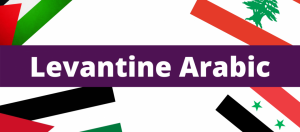Language/South-levantine-arabic/Vocabulary/Feelings-and-Emotions
Hi South Levantine Arabic learners! 😊
In this lesson, we will focus on South Levantine Arabic vocabulary related to feelings and emotions. Learning about feelings and emotions is essential to help you better communicate how you feel, which is crucial when learning a new language. Don't forget, if you need more practice, you can always find native speakers to practice with and ask them any questions. Let's get started!
Basic Emotions[edit | edit source]
Learning how to express basic emotions is essential in all languages. Here are some common basic emotions in South Levantine Arabic and how to express them:
| South Levantine Arabic | Pronunciation | English |
|---|---|---|
| فرحان | farhan | happy |
| حزين | haziin | sad |
| غاضب | ghadab | angry |
| خائف | khaa'if | scared |
| متحمس | motahammis | excited |
Now that you have learned these basic emotions, let's practice using them in a dialogue:
- Person 1: أنا فرحان (Ana farhan) (I am happy)
- Person 2: ماشي حلو شو عملتْ؟ (Mashi 7elo, shu 'amalt?) (That's great, what did you do?)
Other Emotions[edit | edit source]
In addition to the basic emotions, there are many other emotions that you may want to express. Below are some additional South Levantine Arabic words to describe emotions:
| South Levantine Arabic | Pronunciation | English |
|---|---|---|
| حبيب | hbeeb | beloved |
| محبط | mahbet | frustrated |
| مهموم | mahmoom | worried |
| مهضوم | ma7dhoon | annoyed |
| مندهش | mandhesh | surprised |
Now, let's see these emotions in context:
- Person 1: أنا حبيب بشخصية اليوم (Ana hbeeb bshakhsiyet el yom) (I am in a good mood today)
- Person 2: لِّيش؟ (Leesh?) (Why?)
- Person 1: صحيت بالصبح متأخر بطريقة محبطة بس خلص مكنت عم تفكر بالإيجابيات وبعد هسا في نهاية اليوم بتحسب حساب تفاؤلي (Sa7it bissabah met'akher btriyké m7abet bs khalass makont 3am tfakkar bil ijabiyaat w baad hassa fil ni7ayet el youm bte7seb hisaab tafaeli) (I woke up late, which was frustrating, but I stopped thinking about the negative things and now, at the end of the day, I'm being optimistic)
More Expressions[edit | edit source]
Expressions are a great way to add flavor to the language when describing emotions. Below are some common South Levantine Arabic expressions that are used when describing emotions:
| South Levantine Arabic | Pronunciation | English |
|---|---|---|
| عايش على أعصابي | 3ayesh 3ala a3sabi | I'm on edge / I'm nervous |
| محسود | mahsood | envious |
| حريص | harees | ambitious |
| مكتئب | muktap | depressed |
| متوتر | motawater | stressed |
Let's use these expressions in a dialogue:
- Person 1: إيك يا حريص شو كنتْ عم تشتغلْ؟ (Ayik ya harees shu kunt 3am tchtaghal?) (Hey ambitious one, what were you working on?)
- Person 2: في تحضيرات كتير للعملية و كل مرة بصير متوتر أكتر (Fi tahdirat ktir l l3amliya wo kul mara biser motawater aktar) (There are a lot of preparations for the operation and every time I get more stressed)
Proverbs and Sayings[edit | edit source]
Proverbs and sayings are an integral part of South Levantine Arabic culture. Below are some proverbs and sayings related to feelings and emotions:
- لا شمس بدو شمس ولا همس بدو همس (La shams biddo shams wala hams biddo hams) - You can't force someone to love or care about you.
- خفف ع قلبك بالصلاة و الذكر (Kheffef 3a2lbak bel sala wadh-dhikr) - Ease your heart with prayer and remembrance.
- العين بالعين و السن بالسن (El 'ein bil 'ein welsen bil sen) - An eye for an eye and a tooth for a tooth.
- التجربة الألم أم التجربة الأبلة (Et-tajriba al-'alam am et-tajriba al-'abla) - Experience is the best teacher.
Conclusion[edit | edit source]
In this lesson, we have learned South Levantine Arabic vocabulary related to feelings and emotions. Don't forget to practice using these words and expressions in context to become more fluent in the language. To improve your South Levantine Arabic Vocabulary, you can also use the Polyglot Club website. Find native speakers and ask them any questions!
➡ If you have any questions, please ask them in the comments section below.
➡ Feel free to edit this wiki page if you think it can be improved. 😎
Sources[edit | edit source]
Impressive work on finishing this lesson! Explore these additional pages to enhance your understanding: Days of the Week & Animals.
Other Lessons[edit | edit source]
- Colors
- Clothes
- How to Say Hello and Greetings
- Express Surprise
- Geography
- Count to 10
- How to say Good Bye?
- Health
- Useful phrases

